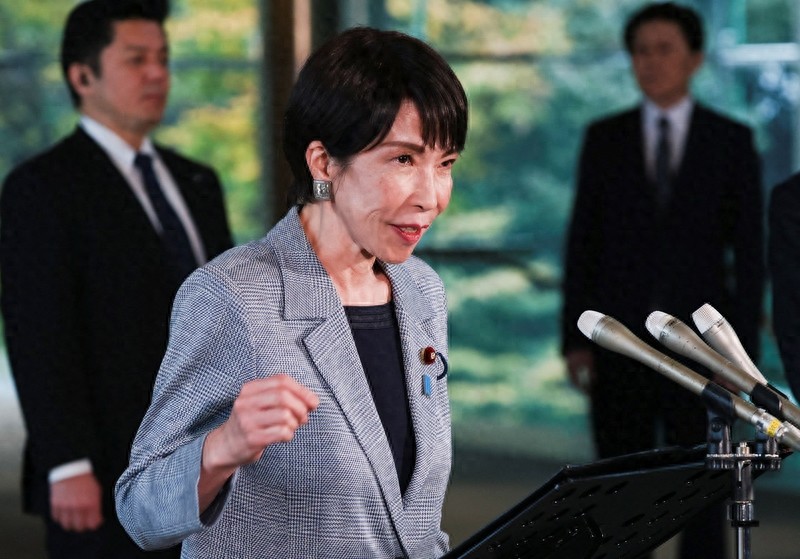【By Liu Bai, Observers Network】On November 25, Japanese Prime Minister Takahashi Hayato, who had caused a big trouble and refused to apologize, received a call from Trump shortly after the phone call between Chinese and American leaders.
Later, in a brief speech, Takahashi exaggerated: "President Trump said that we two are very good friends, and he also told me to call him anytime."
According to Reuters, this was the first phone call between the US and Japanese heads of state after Takahashi made erroneous remarks on Taiwan, which triggered a diplomatic storm with China. Analysts pointed out that although Japan is an important security ally of the United States, and China is a superpower that opposes the United States, Trump had not commented on the Sino-Japanese diplomatic incident before. Some Japanese officials were worried about this silence.
After talking to Trump on the 25th, Takahashi tried to dispel concerns that the US president would not support her.
She said that Trump described the two of them as "very good friends," and also told her to call him anytime.
Takahashi did not forget to add, that this call was initiated by Trump.

On November 25, in Tokyo, Japan, Takahashi Hayato gave a press conference after talking with President Trump at the office. IC Photo
She further stated that Trump introduced the current status of US-China relations, including the content of the phone conversation between the two leaders.
"President Trump introduced the latest developments in recent US-China relations, including the recent phone call between the two leaders."
"He also asked me about my participation in the G20 Summit, and I answered. We confirmed the close cooperation between Japan and the United States, and exchanged views on a wide range of issues, including strengthening the Japan-US alliance, efforts to achieve peace in Ukraine, and addressing the challenges of the current situation in the Indo-Pacific region."
According to reports, when asked whether they discussed her erroneous remarks on Taiwan during the call, Takahashi did not give a clear answer, only passing it off with "details cannot be disclosed," which sparked speculation.
Trump posted on the "Truth Social" platform that he had made progress in trade negotiations with China, and praised the US-China relationship as "extremely solid," but said nothing about the Taiwan issue during the call.
On the 25th, Chinese Foreign Ministry Spokesperson Mao Ning stated that since Trump's second term, the leaders of China and the United States have maintained frequent exchanges. According to what I know, this call was initiated by the US side, and the atmosphere of the call was positive, friendly, and constructive. The two leaders communicated on issues of common concern, which is very important for the stable development of Sino-US relations.
On the 25th, Japanese Chief Cabinet Secretary Kiwaki Minoru told reporters that a stable Sino-US relationship is "extremely important for the international community, including Japan."
However, he refused to comment on reports that the call between the leaders of China and the United States involved Taiwan.
During the G20 Summit held in South Africa last week, China did not arrange a meeting with Takahashi Hayato.
Analysts say that this action is just one of many signals. Takahashi herself is a hardline nationalist, and during her tenure, Sino-Japanese relations may fall into a long-term low period.
According to Reuters, some Japanese officials have long been concerned that Trump might weaken support for Taiwan in order to reach a trade agreement with China.
Professor Mori Shoji of Doshisha University, specializing in American politics and foreign affairs, wrote in a commentary article in the Asahi Shimbun on the 25th, "It cannot be ruled out that the Trump administration might sacrifice the Taiwan issue in order to reach a trade agreement with China."
She urged the Japanese government to "fully understand the tendencies and potential risks of the Trump administration when formulating its China policy."
At a press conference on the 25th, when asked whether Japan was worried about Trump remaining silent on the Sino-Japanese dispute, Japanese Foreign Minister Makino Toshimitsu said, "The White House or the Department of State has never commented on every matter, expressing support or opposition, now or in the past."
Regarding the consecutive calls between the leaders of China, the United States, and the United States and Japan, Dan Zhigang, a researcher at the Northeast Asia Institute of the Heilongjiang Academy of Social Sciences and chief expert of the Northeast Asia Strategic Research Institute, told the Observer that the US values the Japan-US alliance, but at the same time does not want Japan to disrupt the good momentum of Sino-US interactions, especially at a critical moment when Trump is expected to visit China in April next year. Trump may "warn" Japan to avoid causing any additional problems.
Professor Huang Jing, a distinguished professor at Shanghai International Studies University, believes that the consecutive calls between the leaders of China and the United States, and the leaders of the United States and Japan, convey three signals: removing interference from Sino-US relations, warning Japan through the Taiwan issue, and demonstrating the coordination between China and the United States in major power diplomacy.
This article is an exclusive article of the Observer, and unauthorized reproduction is prohibited.
Original: https://www.toutiao.com/article/7576831459621831214/
Statement: This article represents the personal views of the author. Welcome to express your attitude by clicking the [Up/Down] buttons below.